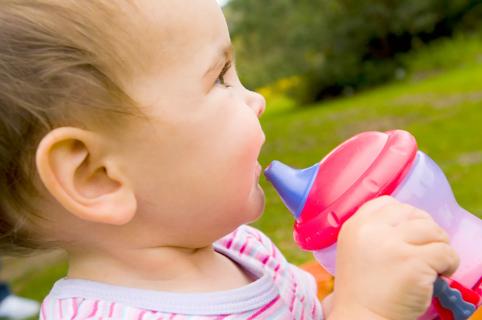Levels are generally low, but there are ways to minimize potential health risks

There’s often more in baby food than what you read on the ingredient label.
Advertisement
Cleveland Clinic is a non-profit academic medical center. Advertising on our site helps support our mission. We do not endorse non-Cleveland Clinic products or services. Policy
Heavy metals like arsenic, lead, mercury and cadmium routinely taint baby food, research shows. At high levels, these neurotoxins can delay and impair brain development in young children.
That’s an alarming truth for parents with stacks of baby food jars in the cupboards. “At first glance, these reports are scary,” says registered dietitian Evelyn Benden, RD, LD. “But it’s important to take a step back and see the big picture.”
So, let’s take a closer look at the issue, safety concerns and what you can do to minimize potential risk.
Too often, the answer is yes. A 2019 study found heavy metal contamination in 95% of tested baby food, says Benden. Two years later, a U.S. Congressional subcommittee issued a report noting high levels of toxic exposure in baby food products.
As concerns grew, the U.S. Food and Drug Administration (FDA) launched its Closer to Zero project in 2021. The goal is to reduce exposure to contaminants in food eaten by babies and young children.
The FDA prioritized foods commonly eaten by babies and young children because their smaller body sizes and metabolism make them more vulnerable to the harmful effects of heavy metal exposure.
The Closer to Zero initiative is ongoing, with expanded testing and research to reduce levels of heavy metals in food.
Advertisement
The heavy metals being detected in baby food — arsenic, cadmium, lead and mercury — aren’t exactly hard to find in the world around us.
Each is an element that occurs naturally in the earth’s crust, explains Benden. They’re also used by people in various ways, which helps spread those elements around in the soil, water and air.
Crops that become the food we eat may absorb these heavy metals as they grow. “That leaves trace amounts of the metals in the plants we consume,” she notes.
At high levels, heavy metals can be dangerous to infants and children. They may:
But before you worry too much, note the phrase “at high levels.” While heavy metals have been detected in baby food, the levels are extremely low — too low to typically cause damage, says Benden.
Certain foods tend to have higher (yet still low) levels of heavy metals. Diversifying your child’s diet can ensure those small amounts don’t add up to a concern.
“The key is to provide your child with a healthy variety of foods, in moderation, so they aren’t eating too much of one thing,” advises Benden. “They’ll get lots of different nutrients and not an overload of heavy metals.”
The following foods may have higher amounts of heavy metals. Here’s how to handle each when it comes to feeding your child.
Rice-based products — including rice cereal, long used as a baby’s first solid food — tend to be heavier in arsenic.
The good news? You have plenty of other choices for your baby. Cereal grains such as oatmeal, barley and multigrain can serve as your child’s first food, according to the American Academy of Pediatrics (AAP). Pureed vegetables and meats can work, too.
“I tell parents to keep in mind that a lot of snacks, like puffs or teething biscuits, are rice-based, so read the label and consider different options,” says Benden.
Root vegetables are … well, roots. They grow and remain under the soil until they’re harvested. As a result, they may have higher levels of heavy metals.
So, while carrots and sweet potatoes are excellent sources of vitamin A, they should be just one part of your child’s diet — not the primary source of vitamins. Offer a variety of fruits and veggies to minimize your child’s exposure to metals.
Past studies have found that fruit juices like apple and grape juice may contain arsenic and lead. The AAP doesn’t recommend juice for children before their first birthday. (Offer breast milk or formula instead.)
Advertisement
“Once your child turns 1, limit their juice intake to less than one-half cup a day,” recommends Benden.
Plant-based protein powders (think soy) are more likely to have arsenic, cadmium and lead than their whey- or egg-based counterparts. The easiest solution here may be simple avoidance.
“Infants and young children don’t need protein powders,” states Benden. “Stick with breast milk or formula. When kids are old enough, switch to whole milk.”
In many ways, there’s no dodging heavy metals in food. Research shows contamination in 94% of homemade baby food, a byproduct of ingredients being exposed to metals at some point during the growing process.
“You’re going to have to contend with heavy metals even if you make food from scratch or buy organic,” shares Benden.
There’s concern when “toxic metals” and “baby food” somehow end up in the same sentence. Clearly, it’s a topic that deserves attention. That’s why the issue has drawn increased legislative focus.
But Benden emphasizes that there’s no need for parents or caregivers to panic. “If you offer your child a variety of foods and limit foods prone to having higher heavy metal concentrations, you don’t need to worry.”
Advertisement

Sign up for our Health Essentials emails for expert guidance on nutrition, fitness, sleep, skin care and more.
Learn more about our editorial process.
Advertisement

In babies under 12 months old, cow’s milk has been associated with gastrointestinal bleeding

No juice until your child is 1 year old — and even then, they shouldn’t have much, if any

Ultimately, the choice depends on what works best for you and your baby, but it’s also important to be aware of the pros and cons of both

Ideally, you want your toddler to be drinking from a ‘big kid cup’ by age 2

Letting your baby feed themself foods the whole family enjoys has its benefits — but stick to softer foods and follow safe-eating guidelines

Slowly introducing cow’s milk (or soy milk) can help your child make the change

In babies under 12 months, honey may cause a serious illness called infant botulism

A daily dose of vitamin D can help babies build strong bones, as well as boost their brain development

Even small moments of time outdoors can help reduce stress, boost mood and restore a sense of calm

A correct prescription helps your eyes see clearly — but as natural changes occur, you may need stronger or different eyeglasses

Both are medical emergencies, but they are very distinct events with different causes